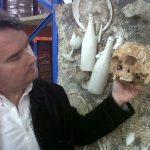Bernard Müller is an anthropologist.
His work focuses on artistic approaches that draw on the toolbox of ethnologists and on methods of ethnographic inquiry that are considered as artistic processes.
Influenced by performance studies, he is interested in the processes of staging and storytelling, whether they be scenic devices (theater, rituals, performances, etc.), museum scenographies or narrative fictions. A specialist in the cultural history of West Africa (Nigeria, Benin, Togo, Ghana), his comparative research is also developing in other fields (Europe and Brazil).
His work focuses on the role of art in the genesis and erosion of identity fictions and civilizational discourses. His 2001 thesis focuses on the role of theater in Yoruba ethnogenesis in Nigeria, the Zomayi project is interested in the cultural resonances of “Brazilians” in Togo, while the project of the unearthing of the “Déjeuner sous l’herbe” is part of a reflection on the role of cultural elites in social movements, and the end of “eras”.
Since 2003, he has directed a seminar at the Ecole des Hautes Etudes en Sciences Sociales (Paris) where he is an associate member of the Institut de Recherche Interdisciplinaire sur les enjeux sociaux (IRIS). He is currently a professor of anthropology at the Ecole Supérieure d’Arts d’Avignon, and a lecturer at the Institut für Ethnologie in Cologne (Germany).”
In addition to his research and dramaturgy activities, Bernard Müller designs scientific and cultural programs: conference cycles, exhibitions, multimedia installations, mediation activities and/or dramaturgies. He has published several books, essays and articles.
He has collaborated with various personalities such as Wole Soyinka (Nobel Prize for Literature 1986), the artist Yinka Shonibare and Daniel Spoerri, and with various cultural institutions (Musée du quai Branly, Centre George Pompidou, Cité Nationale de l’Histoire de l’Immigration-CNHI, la Maison des Sciences de l’Homme (Paris&Saint-Denis), Prins Claus Foundation, Fondation Dapper, l’Institut National de Recherches en Archéologie Préventive-INRAP, Musée en Herbe, Musée Vodou, Le Museum für Völkerkunde Dresden / Leipzig, etc.). .).
He coordinates the activities of CURIO (www.curioweb.org), an indisciplinary research space and chairs the Ouvroir d’Anthropologie Potentielle.
